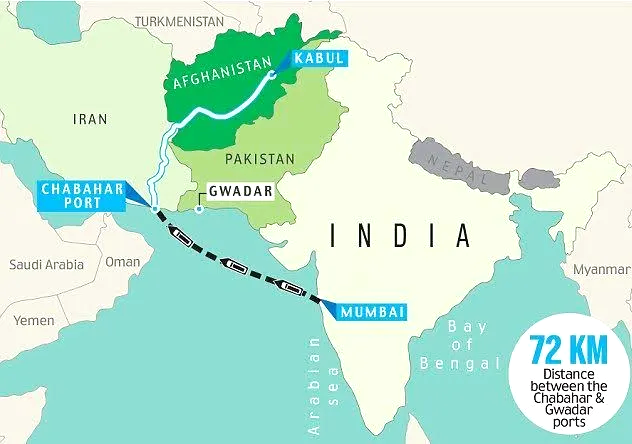International Relations
US Sanctions on Chabahar Port
- 20 Sep 2025
- 7 min read
For Prelims: Chabahar Port, International North-South Transport Corridor, Indian Ports Global Limited, Strait of Hormuz, Belt and Road Initiative, Gulf of Oman.
For Mains: Significance of Chabahar Port for India, Implications of the Revocation of Chabahar Port's Sanctions Waiver for India.
Why in News?
The Trump administration has revoked the sanctions waiver for Chabahar Port, affecting India’s access to Afghanistan and Central Asia and undermining its strategic position in the region.
- The exemption, granted in 2018 under the Iran Freedom and Counter-Proliferation Act (IFCA), allowed India to advance its long-term plan to develop Chabahar Port as a gateway to Afghanistan and Central Asia.
What are the Implications of Revoking Chabahar Port’s Sanctions Waiver for India?
- Strategic Implications: The revocation of Chabahar’s waiver can undermine India’s regional leverage, limiting its ability to counterbalance Gwadar Port, integrate into the International North-South Transport Corridor (INSTC) connecting Russia and Europe, and maintain influence in Afghanistan and Central Asia.
- Economic and Trade Implications: India’s exports to Iran and Afghanistan—including textiles, engineering goods, pharmaceuticals, and food products—face disruption, while investments of USD 120 million and commitments of USD 250 million are at risk.
- The revocation coincides with India-US trade talks and 50% duties on labor-intensive goods, pressuring India’s export strategy.
- Operational and Legal Risks: Companies like Indian Ports Global Limited (IPGL) face exposure to US sanctions under the IFCA potentially causing delays or suspension of Chabahar trade and expansion projects.
- Geopolitical Implications: The revocation puts pressure on India-US relations and marks a major setback for India’s plan to use Chabahar Port as a vital gateway for trade and humanitarian aid, especially to Afghanistan.
Chabahar Port
- About: It is a deep-water port in Sistan-Baluchistan, Iran, on the Makran coast near the Gulf of Oman, outside the Strait of Hormuz.
- It is Iran’s only deep-sea port with direct open-ocean access, providing India secure and direct access for large cargo ships.
- It has two main terminals—Shahid Beheshti and Shahid Kalantari—with India actively involved in developing the Shahid Beheshti Terminal.
- Development & Management: The Chabahar Agreement (2016) was signed between India, Iran, and Afghanistan to establish the International Transport and Transit Corridor.
- IPGL, through its subsidiary India Ports Global Chabahar Free Zone (IPGCFZ), took over Chabahar Port operations in December 2018.
- Operational Performance: To date, Chabahar Port has trans-shipped 2.5 million tonnes of wheat and 2,000 tonnes of pulses from India to Afghanistan, facilitated 40,000 litres of Malathion (environment-friendly pesticide) to Iran in 2021 for locust control, and supported humanitarian aid, including during the Covid-19 pandemic.
What is the Significance of Chabahar Port for India?
- Alternative Trade Route: It provides India an alternative route to Afghanistan and Central Asia, bypassing Pakistan, and improves access to Iran and the INSTC via shorter routes from Kandla Port.
- Ensuring Connectivity: The ongoing conflicts and tensions in the West Asian region, such as the Yemen crisis and the recent escalation between Iran and Pakistan, have disrupted vital maritime trade routes.
- Chabahar provides India with an alternative route for its commercial interests, reducing dependence on traditional chokepoints like the Strait of Hormuz.
- Economic Benefits: It strengthens India’s trade with Central Asia and Afghanistan, diversifies routes, and enhances access to Russia, Europe, Iran, and Afghanistan.
- Chabahar Port, a key INSTC node, links the Indian Ocean to Northern Europe, cutting trade costs by 30% and transit time by 40%, while giving landlocked nations access to the Indian Ocean and Indian markets.
- Humanitarian Assistance: Serves as a crucial entry point for humanitarian aid and reconstruction in Afghanistan.
- Strategic Influence: It strengthens India’s strategic presence in the Indian Ocean, counters China’s Gwadar Port and Belt and Road Initiative (BRI), and enhances anti-piracy capabilities.
Conclusion
Chabahar Port remains central to India’s regional influence, trade prospects, and connectivity ambitions. Its role as a strategic counterweight offers enduring opportunities, despite challenges from US sanctions, regional instability, and competing projects.
|
Drishti Mains Question: Q. Discuss the strategic importance of Chabahar Port for India and analyze the implications of US sanctions on its development. |
UPSC Civil Services Examination, Previous Year Question (PYQ)
Prelims
Q. What is the importance of developing Chabahar Port by India? (2017)
(a) India’s trade with African countries will enormously increase.
(b) India’s relations with oil-producing Arab countries will be strengthened.
(c) India will not depend on Pakistan for access to Afghanistan and Central Asia.
(d) Pakistan will facilitate and protect the installation of a gas pipeline between Iraq and India.
Ans: (c)
Mains
Q. In what ways would the ongoing U.S-Iran Nuclear Pact Controversy affect the national interest of India? How should India respond to this situation? (2018)
Q. The question of India’s Energy Security constitutes the most important part of India’s economic progress. Analyse India’s energy policy cooperation with West Asian countries. (2017)







